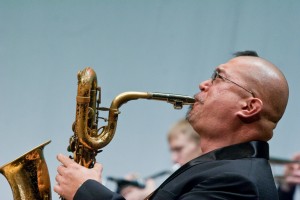 I’m terribly sorry to read in the Times that saxophonist and composer Fred Ho died, at only 56: I knew he had been fighting cancer for years. He gave me a splendidly colorful interview in 1997 that’s reprinted in Music Downtown, beginning, “Fred Wei-han Ho knows how to cut your carotid artery with his hands….” What he learned at Harvard, he said, was that “privilege doesn’t equate with talent, ability, intelligence, or hard work. Privilege is simply privilege.” Fred could be a difficult guy, and no matter how much I tried to support him, I couldn’t quit representing the white power structure in his eyes. Once I published an interview with black violinist Leroy Jenkins in advance of Jenkins’s opera The Mother of Three Sons. I ran into Fred at Leroy’s performance, and volunteered an apology that I was going to have to miss an upcoming concert of his that I had hoped to hear. He shook his head and muttered, “New music is a white man’s game.” Another time I wrote an enthusiastic review of a concert of Fred’s, but took him lightly to task for some rhetoric that I thought was over the top. Almost two years went by, and the next time he saw me he handed me a multi-paged typed rebuttal – as we were backstage at the Kitchen and I was poised to walk onstage to give the New York premiere of Custer and Sitting Bull. Once his back was turned, I did him the profound favor of throwing it away, because I knew if I had let him upset me before that performance I would have never forgiven him. But Fred was a phenomenal performer and a very original composer, with a take on protest music that came from way outside the feckless bourgeois platitudes of academic political music . He died way too soon. (As sometimes happens, it may be easier to give his music its due now that he’s gone.)
I’m terribly sorry to read in the Times that saxophonist and composer Fred Ho died, at only 56: I knew he had been fighting cancer for years. He gave me a splendidly colorful interview in 1997 that’s reprinted in Music Downtown, beginning, “Fred Wei-han Ho knows how to cut your carotid artery with his hands….” What he learned at Harvard, he said, was that “privilege doesn’t equate with talent, ability, intelligence, or hard work. Privilege is simply privilege.” Fred could be a difficult guy, and no matter how much I tried to support him, I couldn’t quit representing the white power structure in his eyes. Once I published an interview with black violinist Leroy Jenkins in advance of Jenkins’s opera The Mother of Three Sons. I ran into Fred at Leroy’s performance, and volunteered an apology that I was going to have to miss an upcoming concert of his that I had hoped to hear. He shook his head and muttered, “New music is a white man’s game.” Another time I wrote an enthusiastic review of a concert of Fred’s, but took him lightly to task for some rhetoric that I thought was over the top. Almost two years went by, and the next time he saw me he handed me a multi-paged typed rebuttal – as we were backstage at the Kitchen and I was poised to walk onstage to give the New York premiere of Custer and Sitting Bull. Once his back was turned, I did him the profound favor of throwing it away, because I knew if I had let him upset me before that performance I would have never forgiven him. But Fred was a phenomenal performer and a very original composer, with a take on protest music that came from way outside the feckless bourgeois platitudes of academic political music . He died way too soon. (As sometimes happens, it may be easier to give his music its due now that he’s gone.)
